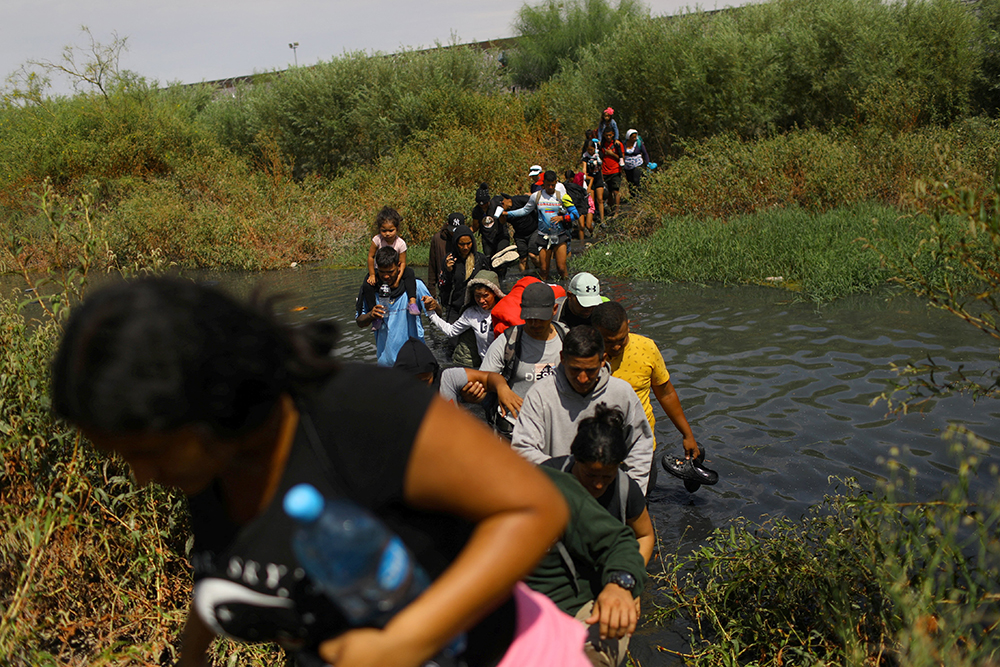
WASHINGTON — The Biden administration’s announcement that it is increasing the number of refugees to the U.S. from Latin America and the Caribbean while decreasing the number allotted from Eastern Europe and Central Asia in the new fiscal year, received a mixed reaction from the chairman of the U.S. bishops’ migration committee.
“We welcome the administration’s efforts to increase resettlement from the Western Hemisphere, while reiterating that this should not come at the expense of other populations,” said Bishop Mark Seitz of El Paso, chairman of the U.S. Conference of Catholic Bishops’ Committee on Migration.
He also called on Congress to continue its “unbroken history of bipartisan support” for the U.S. Refugee Admissions Program.
The administration announced Sept. 29 that the refugee cap for this fiscal year, starting Oct. 1, was 125,000 — the same number as the previous fiscal year. The difference this year is that it aims to admit 35,000 to 50,000 refugees from Latin America and the Caribbean compared to 15,000 of the last fiscal year. It also plans to admit 2,000 to 3,000 refugees from Europe and Central Asia, down from 15,000 this past year.
The refugee cap is the target for how many refugees the U.S. plans to admit each year but there is no guarantee that number of people will be admitted. As of this August, the U.S. accepted only 51,000 of a possible 125,000 refugees. Refugees to the U.S, unlike asylum seekers, have not already come to this country. They are usually referred to the State Department by the U.N.’s refugee agency and then U.S. officials interview and vet them while they’re still abroad.
The administration also announced that it will no longer use an “unallocated reserve” from previous years which allowed it to set aside some openings for other regions.
Bishop Seitz, in a Sept. 30 statement, said the U.S. bishops commended the administration for its “ongoing efforts to ensure the United States is a global leader in refugee resettlement and international humanitarian protection.”
He called this year’s refugee cap “an ambitious and meaningful goal as we reflect not only on the global need but also the challenges facing American communities, including labor shortages, a lack of affordable housing, and high inflation.”
But he also stressed the U.S. bishops’ “solidarity with persecuted Christians around the world, especially those in the Middle East and Asia, who face increased barriers to accessing permanent protection,” and urged the Biden administration “to provide equitable access to refugee resettlement for these populations and to engage with host countries to promote their humane treatment.”
Bishop Setiz stressed that resettlement is “a lifeline for the world’s most vulnerable refugees, and those same refugees have proven time and time again their ability to enrich the communities that welcome them.”
He also pointed out that many American Catholics have experienced being resettled as refugees, are descendants of refugees, or are at the forefront of the Church’s involvement in resettlement efforts.
Through its Department of Migration and Refugee Services, the USCCB is one of 10 national resettlement agencies partnering with the federal government.
For decades, the U.S. admitted more refugees than other countries every year, but it fell behind Canada in 2018. The U.S. admitted the lowest number of refugees — 11,411 — in 2021 under the Trump administration.
Secretary of State Antony Blinken said in a statement that the world is facing an “unprecedented global displacement crisis in which record numbers of people have been forced to flee war, persecution, and instability.”
He said in addition to expanding efforts to resettle refugees from Latin America and the Caribbean, the U.S. was also focused on helping “key populations of concern” such as Afghans who helped the U.S. war effort, human rights advocates, and other groups.
